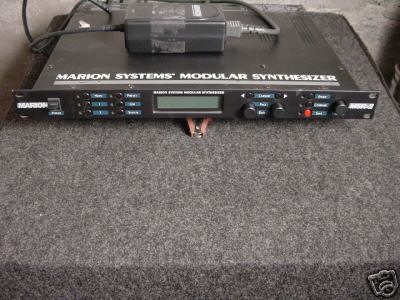
No title link, just this shot pulled via
this auction.
"Up for auction is a used MARION #MSR2 modular synth rack mount. Marion was founded by Tom Oberheim in 1993. It is similar to a Matrix6R. The unit turns on but is untested. It comes from a user who kept his equipment in good working order so I expect it to function well. No manual is included."
I didn't realize it was toted as a "modular" synth. The Oberheim Matrix-6 and of course Matrix-12 are sometimes alluded to as modular-like in that they have extensive modulation capabilities via their "matrix modulation." I wonder if the MSR2 is straight forward enough to program without a manual. The one thing I liked about the Matrix-6 was its relative simplicity. Everything was only one layer deep - no submenus. Everything logically flowed from left to right and all parameters were printed on the surface for easy reference. Some of the trigger modes and modulation sources such as the Ramps and Tracking Generators could use the manual to full grasp them, however in general it's a pretty straight forward synth and you could get away without the manual and just explore. The Matrix-6 was my first and favorite synth. Hence the Matrix in Matrixsynth. I never picked up an MSR2 to compare.
Via Jimmy.
Update via Jimmy in the comments: "It was "Modular" because it had room for two voice cards - the 8-voice analog matrix-style, and another that was planned - though none were ever produced."
I remember this now. I did a little searching and found this great
SOS article on the MSR2. According to Tom Oberheim in the article, "'The MSR2 is a modular synthesizer comprising a 1U mainframe and two plug-in cards, or modules. The card modules utilise a simple connection system which provides MIDI, DC power and audio out. Effectively, each module card is a complete synthesizer, so there's no limitation as to what we can do in the future, and we plan to make the architecture open to third-party developers. Not only can we build synthesizer boards using different synthesis technologies, we could also build boards for effects like reverb, or we could put in a hard-disk recorder for specialised applications.'"
 Title link takes you to The Lords of the Mini, where you will find info on (you guessed it) the Minimoog including the Voyager.
Title link takes you to The Lords of the Mini, where you will find info on (you guessed it) the Minimoog including the Voyager. Title link takes you to The Lords of the Mini, where you will find info on (you guessed it) the Minimoog including the Voyager.
Title link takes you to The Lords of the Mini, where you will find info on (you guessed it) the Minimoog including the Voyager. No title link, just this shot pulled via this auction.
No title link, just this shot pulled via this auction. Videos currently include:
Videos currently include:











